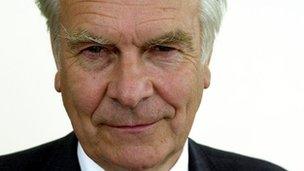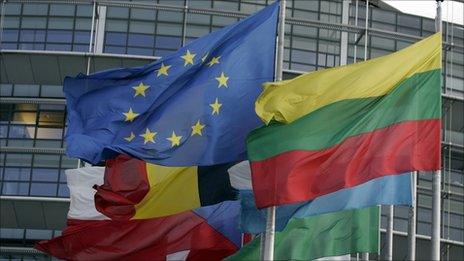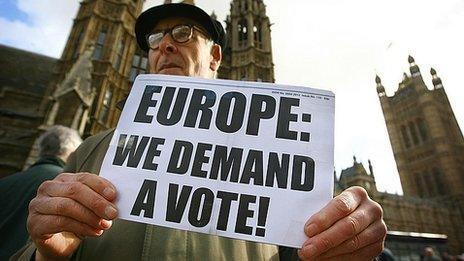Lord Owen: Referendum on EU membership is 'inevitable'
- Published

Voters should be asked whether they are open to the option of joining the eurozone, Lord Owen said
A referendum on the UK's membership of the EU is "inevitable", former Labour Foreign Secretary Lord Owen has said.
In an article for the Times newspaper to coincide with the publication of his book on the future of Europe, Lord Owen predicted it would happen before 2016.
"I am not a Eurosceptic in the way this term has been used for people hostile to Europe," he wrote.
But there needs to be "limits set to the process of European integration", the former SDP leader argued.
Lord Owen advocated the creation of a two-tier European system: a European Community based on trade that would "hopefully" encompass countries like Turkey and Norway; and a separate, deeper European Union that would feature "to all intents and purposes, though not in name, a single government".
British voters should be asked whether they want the UK to be part of either group, he said, in a two-question referendum.
He predicted that the UK would vote "yes" to continuing membership of the single market, or his vision of a European Community.
The answer to the second question was harder to foresee, Lord Owen said, speculating that the government might opt to remain neutral on the subject, "ready to follow rather than lead public opinion".
The growing strength of the UK Independence Party might force the Conservatives to commit to a referendum on the subject as part of their next election campaign, he suggested.
Lord Owen, who campaigned against the creation of the euro, said the design of the eurozone had been "fundamentally flawed".
EU institutions had left British people feeling that they were unable to influence their own destiny, he lamented.
"The British public do not like to feel they are being pushed around. We are loyal members of clubs, but not afraid to restructure a club to suit different circumstances. We are not afraid of change," he wrote.
Lord Owen: We would be far stronger in Europe if its seen that we speak with one voice
"We just want our politicians to uphold our right to democratic self-government in this country."
Speaking on BBC Radio 4's the Today programme, Chancellor George Osborne rejected Lord Owen's arguments.
There would be no need for a referendum unless there were any further transfers of power from Westminster to the EU, he said.
Parliament has passed legislation binding future governments to hold a referendum in such circumstances, a measure ministers have described as a referendum lock.
Mr Osborne said the law was little-noticed at the time, but would prove to be "one of the most significant" achievements of the government.
- Published19 October 2011

- Published21 May 2015
